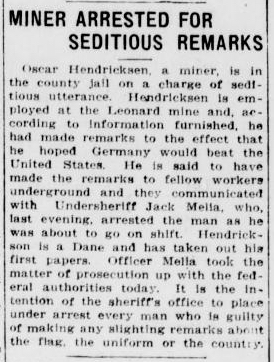As part of my “Montana in WWI” series, I like to take a look at Montana newspapers from time to time. From the Butte Daily Post on May 1, 1917, comes this interesting newspaper article . . .

The article is transcribed below:
MINER ARRESTED FOR
SEDITIOUS REMARKS
—————————
Oscar Hendricksen, a miner, is in
the county jail on a charge of sedi-
tious utterance. Hendricksen is em-
ployed at the Leonard mine and ac-
cording to information furnished, he
had made remarks to the effect that
he hoped Germany would beat the
United States. He is said to have
made the remarks to fellow workers
underground and they communicated
with Undersheriff Jack Melia, who,
last evening arrested the man as he
was about to go on shift. Hendrick-
son is a Dane and has taken out his
first papers. Officer Melia took the
matter of prosecution up with the fed-
eral authorities today. It is the in-
tention of the sheriff’s office to place
under arrest every man who is guilty
of making any slighting remarks about
the flag, the uniform of the country.
After reading the article, I wondered what law Mr. Hendricksen had broken. Being somewhat familiar with the sedition laws in existence during WWI, I assumed it must have been either a federal or state law.
However, this is what I found out . . .
- The State of Montana Sedition Act wasn’t passed until February 22, 1918 – nearly 10 months after Mr. Hendrickson was arrested.
- The federal Sedition Act of 1918 wasn’t enacted by Congress until May 16, 1918 – a year after Mr. Hendrickson was arrested.1
So what was going on? A little online searching turned up a few clues.
Although many Montanans were supportive of the decision to join in the war effort, Montana congresswoman Jeanette Rankin, supported by a size-able group of her constituents, voted against U.S. involvement.
And in a state where a large number of people were recent immigrants – Irish immigrants who were anti-British and Finnish immigrants who were anti-Russian, and of course the German immigrants themselves, together with the ever-present labor issues surrounding the mining industry – tensions were high in Montana during this time. In particular, Butte had experienced increasing labor violence in the years leading up to the war.
In a move to deal with both antiwar sentiment and labor unrest, the Montana legislature ultimately voted to pass the Montana Sedition Act.
According to The Montana Sedition Project, 79 people in Montana alone were eventually convicted of sedition under Montana law.
The oldest was 74 and the youngest was 29. Collectively, the prisoners ended up serving more than 65 years in prison, an average of 19 months apiece.
Again, Mr. Hendrickson was arrested prior to both the state and federal sedition laws were in place, and I’ve been unable to determine his outcome.
Sources and links to web sites dealing with this complicated issue are as follows:
This day in History, February 22, 1918: Montana Passes Law Against Sedition
Copyright (c) 2017, Lark M. Dalin Robart
NOTES
- The Sedition Act of 1918 was an extension of the Espionage Act, which was not passed until June 15, 1917 – several weeks after Mr. Hendrickson was arrested. ↩

